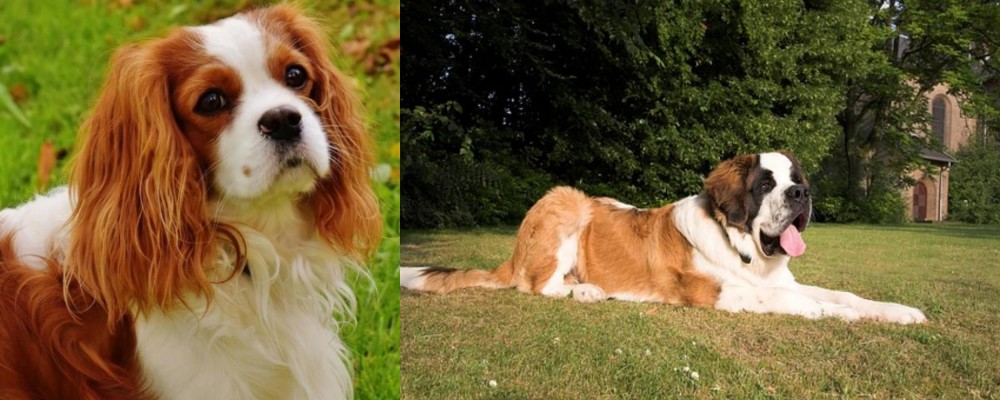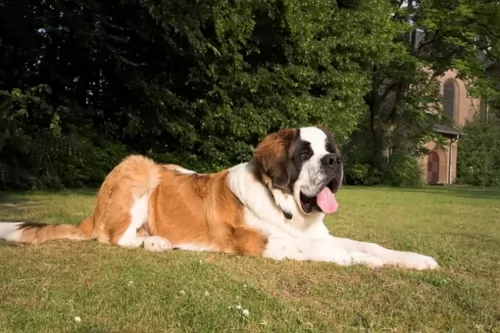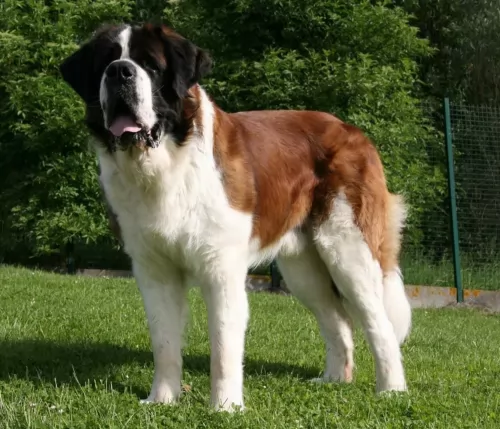 Petzlover
Petzlover Cavalier King Charles Spaniel is originated from United Kingdom but St. Bernard is originated from Switzerland. Cavalier King Charles Spaniel may grow 38 cm / 14 inches shorter than St. Bernard. Cavalier King Charles Spaniel may weigh 81 kg / 178 pounds lesser than St. Bernard. Cavalier King Charles Spaniel may live 4 years more than St. Bernard. Cavalier King Charles Spaniel may have less litter size than St. Bernard. Cavalier King Charles Spaniel requires Moderate Maintenance. But St. Bernard requires High Maintenance
Cavalier King Charles Spaniel is originated from United Kingdom but St. Bernard is originated from Switzerland. Cavalier King Charles Spaniel may grow 38 cm / 14 inches shorter than St. Bernard. Cavalier King Charles Spaniel may weigh 81 kg / 178 pounds lesser than St. Bernard. Cavalier King Charles Spaniel may live 4 years more than St. Bernard. Cavalier King Charles Spaniel may have less litter size than St. Bernard. Cavalier King Charles Spaniel requires Moderate Maintenance. But St. Bernard requires High Maintenance
 The origin of the Cavalier King Charles Spaniel goes back many centuries. It was in 1928 that this spaniel breed was separated from the smaller King Charles and these were particularly popular with royalty in England.
The origin of the Cavalier King Charles Spaniel goes back many centuries. It was in 1928 that this spaniel breed was separated from the smaller King Charles and these were particularly popular with royalty in England.
In fact, Mary, Queen of Scots had one of these spaniels who accompanied her to her beheading. It was her grandsons who gave their name to the breed, and King Charles II, who reigned from 1660 to 1685 kept these dogs. After Charles II's death, the dog’s popularity waned somewhat. The dog was later bred with pugs giving them the familiar features they have today, such as the domed head and the shorter nose.
Interest in the breed revived, and a breed -club was established, drawing up a breed standard. Finally, in 1945, the Cavalier King Charles Spaniel was recognized as a separate breed.
 The St Bernard breed was once called the Alpine Cattle Dogs or the Alpine Mountain Dogs. They have always been farm dogs and mountain dogs in the French and Swiss Alps. They come from the border land of Switzerland and France. They were herding dogs, hunting, search and rescue, watchdogs and draft dogs.
The St Bernard breed was once called the Alpine Cattle Dogs or the Alpine Mountain Dogs. They have always been farm dogs and mountain dogs in the French and Swiss Alps. They come from the border land of Switzerland and France. They were herding dogs, hunting, search and rescue, watchdogs and draft dogs.
Their ancestors are considered to include the Sennenhunds and molosser breeds that came to the Alps with the ancient Romans. There are four Sennenhund breeds that are believed to have contributed to the original St. Bernard. These included the Greater Swiss Mountain Dog (Grosser Schweizer Sennenhund), the Appenzeller (Appenzeller Sennenhund), the Bernese Mountain Dog (Berner Sennenhund) and the Entlebucher Mountain Dog (Entlebucher Sennenhund) Today the St. Bernard is considered a Molossoid breed.
The first we know of the St. Bernard in any written records was in 1707 at the Great St. Bernard Pass and Great St. Bernard Hospice run by monks. There were found paintings of the dogs dating back into the late 1600’s. It is told that Barry saved upward of 100 people in the St. Bernard pass, and it is from these stories that the dogs gained their snow rescue reputation.
The St. Bernard of that time did not look like the St. Bernard does today as there was much crossbreeding. Many dogs dies during rescues in the avalanches of the mid 1800’s and so they Saint was crossed with the Newfoundland to preserve the breed. You can today see the resemblance in the build and looks of the two breeds. This cross brought about the long haired St. Bernard whose fur was too heavy for rescues.
The St. Bernards of mountain rescue fame were only about the size of a German Shepherd dog and were short haired. After crossing with the Newfoundland and moving into clubs and dogs shows, they have been bred to be much larger. Before the stud book was closed, it is thought that many larger breeds such as the Greater Swiss Mountain Dog, the English Mastiff, the Tibetan Mastiff, the Rottweiler, the Great Pyrenees, the English Bulldog, the Great Dane, the Bernese Mountain Dog, the Boxer and the Caucasian Oycharka all contributed to today’s St. Bernard.
In 1884 The Swiss St. Bernard Club was founded and the breed entered the Swiss Stud book as its first entry in 1884. It was 1888 when the standard was approved and the breed became the national dog of Switzerland. Before the name St. Bernard came to be common, these dogs might be called, Barry Dogs, Alepnmastiff, Noble Steeds or Saint Dogs.
The dogs came to England in the early 1800s and to the United States soon after. They were recognized by the European kennel clubs first and by the early 1900’s they were the most popular breed in the AKC.
 The Cavalier King Charles Spaniel is a small to medium sized dog wih its height being 31 – 33cm and its weight being 5 – 8 or 9 kg. He is known for his long, silky coat which is fairly straight and feathery.
The Cavalier King Charles Spaniel is a small to medium sized dog wih its height being 31 – 33cm and its weight being 5 – 8 or 9 kg. He is known for his long, silky coat which is fairly straight and feathery.
He has floppy ears, and with this Spaniel breed the tail is generally left long and feathery. The coat comes in many different colors so you will find the popular rich red shade with white, he can be black and tan or even tri-color.
The Cavalier King Charles Spaniel is affectionate, playful and eager to please. He makes an excellent pet for children as well and gets on well with other pets in the home too.
They adapt quickly to different environments and will be happy in the city or in the country, so long as his owner is with him and meters out lots of love and attention. He is intelligent and responds well to training and socialization, turning him from a playful puppy into a relaxed, obedient adult dog.
The Cavalier loves to be active but he also loves to be quietly lying next to his owner. It is also why these dogs make such splendid companions for the elderly as well as being a good choice for therapy dogs.
 Today’s St. Bernard is not a large dog, he is a giant dog. Weighing in at 140-200 pounds and standing 28 to 35 inches tall, he is a lot of dog. Bred with mastiffs and large mountain dogs, they have proportional and powerful build. They are strong, sturdy and well muscled. They have either a smooth or rough (short or long) coat. Their eyes are brown or occasionally blue. They have tight lids, and square heads and muzzles.
Today’s St. Bernard is not a large dog, he is a giant dog. Weighing in at 140-200 pounds and standing 28 to 35 inches tall, he is a lot of dog. Bred with mastiffs and large mountain dogs, they have proportional and powerful build. They are strong, sturdy and well muscled. They have either a smooth or rough (short or long) coat. Their eyes are brown or occasionally blue. They have tight lids, and square heads and muzzles.
There are two coat types called smooth and rough, or short and long. The smooth shorter coat is tough, flat and close against the body and the long, rough coat is dense, wavy and heavy around the legs, neck and ruff. Both types have long tails that hang low and are heavy. Saints are known to slobber, drool and snore.
 The Cavlier King Charles Spaniel is an affectionate, playful and eager-to-please dog breed that is good with children and other dogs. They will be happy to join you in any games you have in mind but will easily lie quietly beside you for companionship too.
The Cavlier King Charles Spaniel is an affectionate, playful and eager-to-please dog breed that is good with children and other dogs. They will be happy to join you in any games you have in mind but will easily lie quietly beside you for companionship too.
This spaniel breed is exceptionally intelligent and can be easily trained and socialized, making them even better behaved dogs.
For their gentle, sweet nature, it is no wonder that they make such excellent therapy dogs for children and adults, and he is willing to be a wonderful friend to you too.
 3.Adaptability no - these are giant dogs that need a lot of room. A large fenced yard or farm is best. They won’t do well in an apartment. They need exercise every day and loping around a yard is very good for them. They love to play in the snow, carry a backpack or pull a cart. They love to have a “job”
3.Adaptability no - these are giant dogs that need a lot of room. A large fenced yard or farm is best. They won’t do well in an apartment. They need exercise every day and loping around a yard is very good for them. They love to play in the snow, carry a backpack or pull a cart. They love to have a “job”
4.Learning ability – They are smart and highly trainable if motivated. They may appear lazy but they are just laid back and need a motivation.
 Cavaliers are generally fairly healthy dogs but they are prone to mitral valve disease which can lead to heart failure. The heart as 4 chambers and each chamber has a one-way valve to keep blood from flowing backward. One of these is the mitral valve and it can leak over time resulting in a heart murmur. Dogs as young as 4 years of age can develop a murmur from a leaking mitral valve.
Cavaliers are generally fairly healthy dogs but they are prone to mitral valve disease which can lead to heart failure. The heart as 4 chambers and each chamber has a one-way valve to keep blood from flowing backward. One of these is the mitral valve and it can leak over time resulting in a heart murmur. Dogs as young as 4 years of age can develop a murmur from a leaking mitral valve.
Congestive heart failure develops, your dog has a chronic cough and lacks stamina. A veterinary cardiologist may need to be called in to recommend some kind of medical intervention. The vet will evaluate your pet's condition and lifestyle before making a recommendation.
Other health problems which the Cavalier might have to contend with will be luxating patella as well as eye issues.
This condition affects toy breeds, occuring when the kneecaps slip out of place. It can be severe enough to cause lameness in the dogs leg, but fortunately it can be managed with an anti-inflammatory or even surgery.
 The first problem this breed faces is how fast they grow and gain weight. This can lead to serious health issues if not controlled. Their bones can be damaged by this excessively fast rate of growth. Other issues facing the breed include:
The first problem this breed faces is how fast they grow and gain weight. This can lead to serious health issues if not controlled. Their bones can be damaged by this excessively fast rate of growth. Other issues facing the breed include:
 The Cavalier Spaniel’s long silky coat will require brushing at least twice a week to remove loose hairs and to keep it healthy and shiny. This is one spaniel however, that won’t require trimming. However, because he loves to be playing outdoors, some owners do trim the dog’s feathers around the legs and paws.
The Cavalier Spaniel’s long silky coat will require brushing at least twice a week to remove loose hairs and to keep it healthy and shiny. This is one spaniel however, that won’t require trimming. However, because he loves to be playing outdoors, some owners do trim the dog’s feathers around the legs and paws.
As a dog with floppy ears, it will become essential to check his ears for wax build-up and moisture within the ears combined with dirt. This can lead to ear infections. Also the silky ears can be prone to matting. You can wash them gently with dog shampoo.
Smaller dogs like the Cavalier Spaniel are more likely to develop dental problems because of the structure of their skulls and jaws which are more compressed. Brush your dogs teeth 2 or 3 times a week with special canine tooth-paste and toothbrush.
 1.Feeding the puppy – You want to control their growth. Do not overfeed, and make sure they exercise but not too much. Feed a high quality large breed puppy food 3-4 X a day in small amounts.
1.Feeding the puppy – You want to control their growth. Do not overfeed, and make sure they exercise but not too much. Feed a high quality large breed puppy food 3-4 X a day in small amounts.
2.Feeding the adult – The problem you face with he adult St. Bernard is the potential for Bloat. Don’t over feed. Don’t feed before or after strenuous exercise. Feed 2-3 X a day in smaller amounts to prevent Bloat. Feed a high quality breed specific food if possible or an extra large breed formula.
4. Games and Exercises They need exercise but not as much as you might think. The St. Bernard is a laid back lumbering character so don’t over exercise her. They enjoy weight and cart pulling but they are not athletes who enjoy frisbee or agility. Search and rescue trials and tracking trials are perfect athletic endeavors for them.